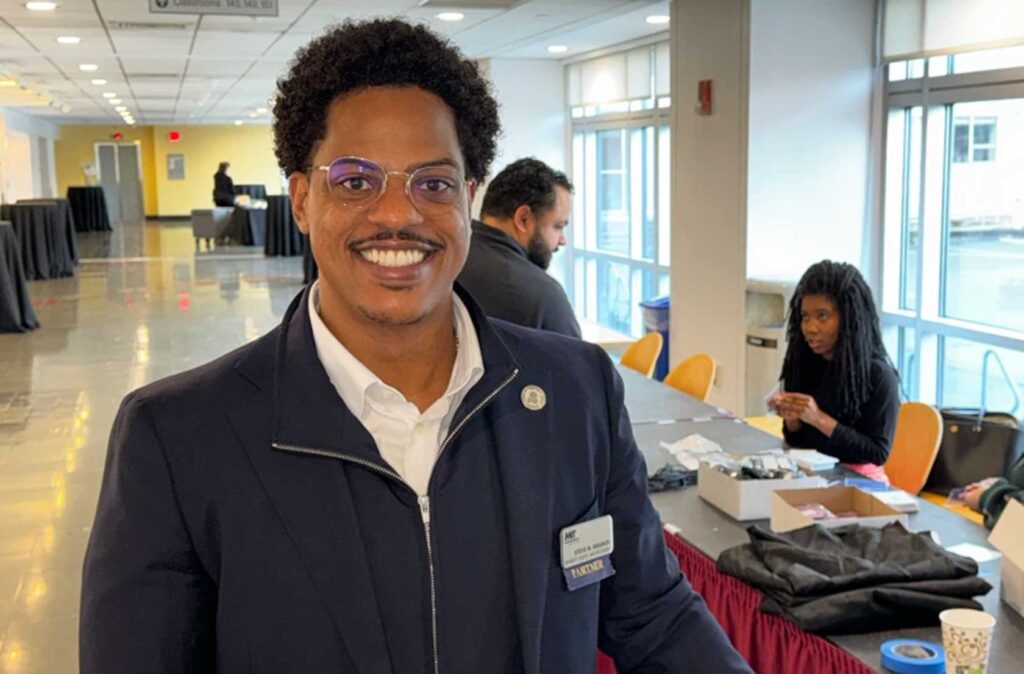
The MIT Sloan School of Management gathered students, government officials and business leaders Friday to highlight a huge potential workforce that is often overlooked: people with criminal records.
Speakers at the conference noted that there are between 70 million and 100 million Americans with criminal records, and many face stigma when applying for jobs, even when many industries are facing a dire shortage of workers. Today’s hiring managers, and MIT Sloan students — hiring managers of the future — connected on methods to reduce barriers and increase opportunities for job seekers with a criminal history.
“If you are practicing diversity and inclusion, which most companies at least claim to do, you need to consider all of the applicants and give people the opportunity to compete,” said Ken Oliver, vice president of corporate social responsibility at Checkr. “Because somebody has a record shouldn’t automatically exclude them.”
Checkr, one of the event’s sponsors, provides automated background checks for employers. When the company began to notice that jobseekers were being rejected because of their criminal histories, it created a new service to help those job-seekers explain their backgrounds to potential employers — and to help employers understand that not all criminal records were relevant to their job search. For instance, Checkr now has filters that allow employers to dismiss marijuana-based charges in places where marijuana possession is no longer illegal.
The event was hosted by Steven Branch, the senior associate director of diversity, equity and inclusion in MIT Sloan’s career development office. He said students want to learn about diversifying workplaces, and that formerly incarcerated people should be part of that effort.
Since Sloan’s mission is to produce the next generation of business leaders, “How could we do that without broaching this topic?” Branch said. “We’re going to be sending out the next bosses, the next presidents, the next entrepreneurs who will be hiring tons and tons of talent,” he said. “If we can’t break the mindset around it with our students … how can we do that with people who are already in industry?”
Oliver — who spent 24 years in California prisons — said he recognizes that, in many cases, people returning from long prison terms will need extra training to get up to speed in a modern workplace.
“We can’t ask businesses to lower the bar” for new hires, he said. “We’re really asking businesses to lower the barriers.”
Some of those barriers are regulations that keep people from getting licensed in certain industries if they have a conviction, and a lack of investment in preparing incarcerated people for the workforce.
When Oliver got out of prison, he said he worked with the state of California on a program to boost hiring of people with criminal records.
“You guys are spending $130,000 a year to keep a person in the cell for a year. That’s taxpayer dollars,” he said. “You can give me half of that money, I can educate a person, house a person, teach people financial literacy, digital literacy, clothe them. … I can do everything with them. And when they graduate from their program, they’ll be tax assets to the state rather than tax deficits.”
Over the past year, the GBH News Center for Investigative Reporting has been documenting the challenges faces by thousands of formerly incarcerated people in Massachusetts, including a dramatic shortage of educational and job training opportunities inside state prisons.
Former Chicago Mayor Lori Lightfoot told the conference that government has a role — but it requires the private sector to also step up. For starters, she said, government has to be a role model in hiring people with past criminal convictions, and has to be providing training programs in prisons and jails to “make sure that people are coming out of incarceration thinking about the future.”
But “we have to have partnership with the private sector,” she said. Otherwise, “we are not going to employ these people the way that we need to. We are not going to be building long-term futures for them and their families.”
While the “second-chance hiring” conference was a first for Sloan, Branch says he is confident the school will continue to delve into this work. He said Sloan students created a new organization this year to support prison education initiatives and to work with other MIT programs that are teaching in prisons and jails in Massachusetts.
But for him, a key goal is just having management students exposed to the issue of second chance hiring, so that it is not “taboo” for them.
“When you walk away from that room, you can’t say you’ve never heard of this before when you’re the new hiring manager,” Branch said.
Paul Singer is the investigations & impact editor at the GBH News Center for Investigative Reporting.






